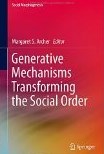Departmental news
BSA Regional event 11th March 2016 - A Call for Abstracts
A BSA regional event on Educational (In)equalities: Towards an elite but not elitist society will take place on 11th March 2016. Keynote speakers will include Professor Fiona Devine (University of Manchester) and Dr Clare Maxwell (IOE UCL).
We welcome abstracts of 250 words on the topic of unequal distribution of privilege in educational practices. Themes can include but are not limited to:
- Class and social divisions
- Structural social inequalities
- Ideas of privilege and social stratification
- Social class in contemporary urban contexts
Please send all correspondence to I.Konstantinou@warwick.ac.uk by 31st January 2016.
New Article by Professor Deborah Steinberg - Bowie, Diana, and Why We Mourn in Public
The Department is pleased to announce Professor Deborah Steinberg's new artice in The Converation on Public Mourning. You can read the article here
New Article by Dr Thom Davies on Informal Refugee Camps in Calais
A new article by Dr Thom Davies (Warwick) and Dr Arshad Isakjee (Birmingham) reflects upon some preliminary research in the informal refugee camp in Calais, northern France. The short piece, titled ‘Geography, Migration and Abandonment in the Calais Refugee Camp’ is published in Political Geography, Vol. 49. You can read the article here.
New Article From Dr Stella Chatzitheochari on the Time Allocation of Young People
Dr Stella Chatzitheochari is co-author of a short article on measuring time allocation of young people in the Millennium Cohort Study Age 14 survey, with colleagues from the University of Oxford, University College London, and Ipsos MORI. The article appears in Volume 12 of the electronic International Journal of Time Use Research (eIJTUR) and can be accessed here: eijtur.org/content.php
New publication from Professor Wing Chan
The Department of Sociology are delighted to announce that Professor Wing Chan and Professor John Ermisch have had an article pulished in Population Studies. The article entitled 'Residential proximity of parents and their adult offspring in the United Kingdom, 2009–10' can be found in Population Studies, 2015, Vol. 69, No. 3, 355–372.
Body and Society Special Issue - ‘Estranged Bodies: Shifting Paradigms and the Biomedical Imaginary’
The Department of Sociology is pleased to announce that Professor Deborah Lynn Steinberg has guest edited a special issue of Body and Society 2015 ‘Estranged Bodies: Shifting Paradigms and the Biomedical Imaginary’ http://bod.sagepub.com/content/21/3.toc and that this has just been published.
The Relational Subject
It is with great pleasure that the Department of Sociology can announce that Professor Margaret S. Archer has published a new book with Professor Pierpaolo Donati on 'The Relational Subject'.
Generative Mechanisms Transforming The Social Order
 This new book
This new book edited by Margaret Archer and collecting the work of the Centre for Social Ontology’s collaborators has just been released. It is the latest volume in the Social Morphogenesis series
edited by Margaret Archer and collecting the work of the Centre for Social Ontology’s collaborators has just been released. It is the latest volume in the Social Morphogenesis series and examines how generative mechanisms emerge in the social order and their consequences. It does so in the light of finding answers to the general question posed in this book series: Will Late Modernity be replaced by a social formation that could be called Morphogenic Society?
and examines how generative mechanisms emerge in the social order and their consequences. It does so in the light of finding answers to the general question posed in this book series: Will Late Modernity be replaced by a social formation that could be called Morphogenic Society?
This volume clarifies what a ‘generative mechanism’ is, to achieve a better understanding of their social origins, and to delineate in what way such mechanisms exert effects within a current social formation, either stabilizing it or leading to changes potentially replacing it . The book explores questions about conjuncture, convergence and countervailing effects of morphogenetic mechanisms in order to assess their impact. Simultaneously, it looks at how products of positive feedback intertwine with the results of (morphostatic) negative feedback. This process also requires clarification, especially about the conditions under which morphostasis prevails over morphogenesis and vice versa. It raises the issue as to whether their co-existence can be other than short-lived.
The volume addresses whether or not there also is a process of ‘morpho-necrosis’, i.e. the ultimate demise of certain morphostatic mechanisms, such that they cannot ‘recover’. The book concludes that not only are generative mechanisms required to explain associations between variables involved in the replacement of Late Modernity by Morphogenic Society, but they are also robust enough to account for cases and times when such variables show no significant correlations.
Latest MRC Information Bulletin
Information Bulletin no.89 gives an up-date on developments at the Centre since the end of the period covered by our last annual report (July 2011). In it you can find out about our new staff member, notable accessions, new or revised catalogues, digitisation and website developments, and how groups and individuals have used the Centre.
Our annual report for 2010/11 is now available
The report documents a notable year in the Centre's history, during which our premises were transformed and we embarked on a major digitisation project. For details of these and other developments, read the full report (pdf format).
